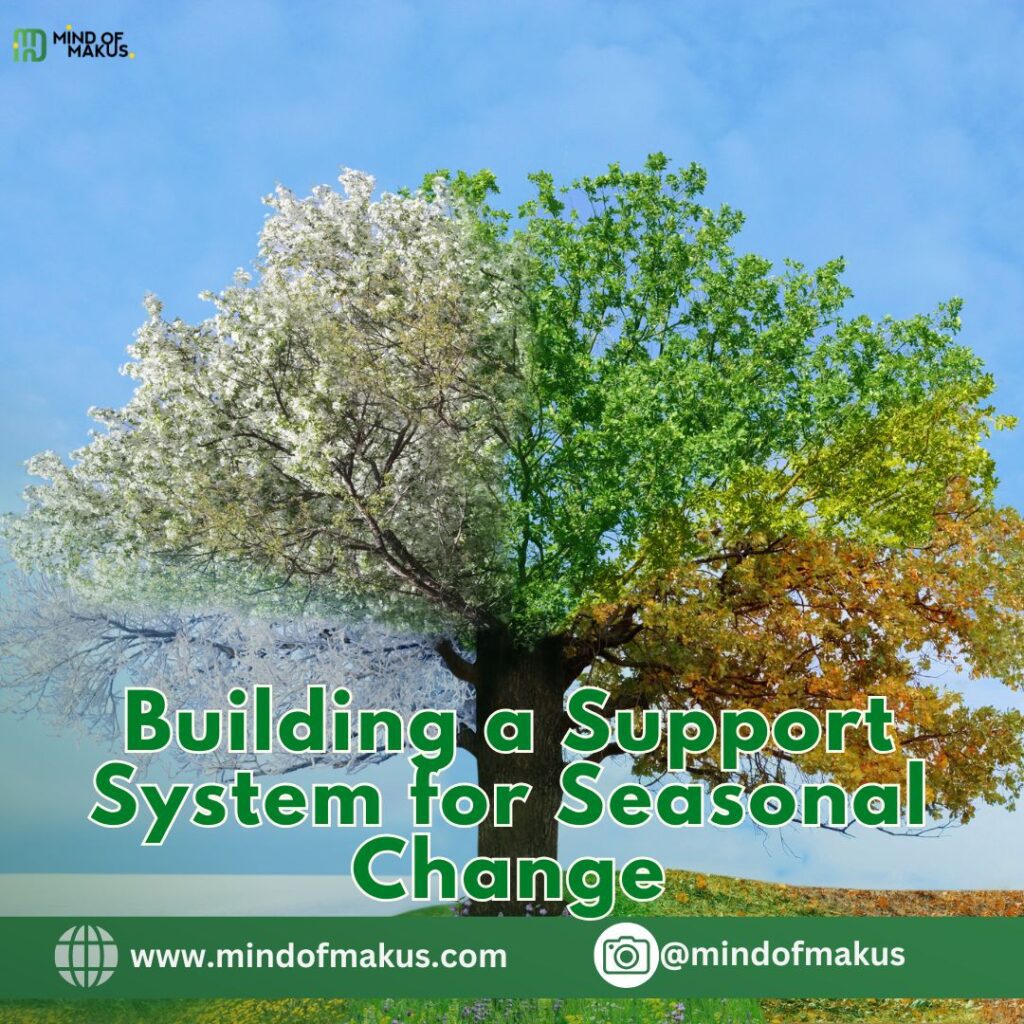Hello dear friend,
Welcome to Autumn, we are firmly in it. It’s such a beautiful time of the year because you don’t have freezing cold, but you have cool winds and sunshine.
Fashion is such a vibe in this season because you can literally wear all the seasons and the colours burst out of people’s wardrobes. Go bold and go colourful this time. Can you tell I love it?
Seasonal changes are beautiful reminders of the cycles of life—new beginnings in spring, the warmth of summer, cozy autumn days, and the quiet reflection of winter.
But while these shifts can be refreshing, they can also bring emotional and mental challenges. For many, seasonal changes can impact mood, energy levels, and motivation. That’s why building a strong support system is essential for navigating these transitions with resilience and balance.
I can remember feeling quite stressed about the season change, and all of a sudden, there is an urgency in the air; people want to go home quickly and don’t want to be outdoors. The outdoors are gray and dark, people are lacking in wholesome community and connection, which starts to show that you are lacking in friends and family, especially if you are an expatriate.


Your work colleagues have plans, but your own plans have fizzled out with the sun.
Calm down.
Why Seasonal Changes Impact Us
It’s not “all in your head.” Seasonal shifts bring real changes to the body and mind. For instance:
● Daylight fluctuations affect our circadian rhythm and melatonin production. We are supposed to start work earlier and go to bed earlier. Alas, capitalism.
● Colder months can sometimes trigger Seasonal Affective Disorder (SAD), leading to feelings of sadness or fatigue.
● Warmer months may bring social pressure or burnout from packed schedules.
Being aware of these patterns helps us prepare—and that’s where a support system comes in. You see, that’s the real hack AWARENESS.
If we are going to be mentally resilient and prevent breakdowns and burnout, we must be aware of the seasons. Seasons of life, seasons of the weather, seasons of relationships, seasons of career. Be aware of where you stand right now.
As much as we are encouraged to plan ahead, you cannot successfully plan without being honest and aware of your current situation.


What a Healthy Support System Looks Like
A support system isn’t just about having people around you; it’s about creating intentional connections and practices that help you thrive. Start to think about these things one by one:
1. Lean on Your Inner Circle
Reach out to friends, family, or colleagues you trust. Share openly about how seasonal changes affect you. Sometimes just having someone check in can make all the difference. Start with the people in your household, then move on to those you trust outside. Discuss ways to keep your energy up and ask them to hold you accountable.
2. Join Communities That Uplift You
Whether it’s an online mental health group, a local hobby club, or a faith-based community, shared experiences remind you that you’re not alone. They sometimes motivate you to get out of the routine of staying indoors and isolating yourself.
My church organises something called a “ Warm Hub”, it’s such a gift for people who otherwise don’t have anyone to socialize with. It may not be your cup of tea, but you could start something like that and serve others. Volunteer at your local food bank or charity shop for an hour or two.
Break the mould of familiarity.
3. Work With Professionals
Therapists, counselors, or coaches can provide tools for managing mood fluctuations. Even a few sessions can give you lifelong coping strategies.
You also don’t need to discuss things from the past in therapy; just focus on what you came there for, help with your mood, and the seasonal change. Or anything else.
Subscribe to My Newsletter
4. Build Daily Rituals
Your habits form a huge part of your support system; the things you do every day make the most difference to your life, for good or for bad. Think about what could make your morning a better quality experience. Can your alarm be earlier, and your bedtime be earlier?
Can you prep your meals ahead? Can you take morning walks, slowly engage in journaling, or schedule regular breaks from work to take a walk or do some breathing exercises? These small practices ground you during transitions.
5. Incorporate Light and Movement
Especially in colder months, use light therapy lamps. You can easily get them from Amazon or local shops. Switch up the brightness of your bulbs indoors. The irony of this is that in the UK, because of increased spending on heating, most people switch off their lights to save on expenses.
It is not smart if it will make you sad. Spend time outdoors, utilizing gardens and walks in the park after investing in some good coats and gloves. Commit to gentle movement; if you are able to go hard, do so. The more you move your body daily, the better.
Physical activity and natural light are powerful mood boosters.
Get your health checks, check your vitamins, and blood levels this month.
6. Encourage Two-Way Support
Support is not one-sided. By offering encouragement to others, you strengthen your own resilience and create deeper, more meaningful bonds. Come up with things that support others. Game nights, group walks, hikes, grill nights, card games, potlucks at work, plan for Christmas, and book events with friends.
Get ahead of it. Take charge of your mood; you can win the game. Feelings come and go, allow them to come, but know that they will go.


Why It Matters
Building a support system isn’t just about “getting through” seasonal change—it’s about growing through it. With the right people and practices around you, each season becomes an opportunity to embrace change rather than fear it.
You can Support My Work
Final Thoughts
Seasons remind us that change is constant. While you can’t control the weather or daylight hours, you can control how you prepare for them. By intentionally building a support system—through relationships, habits, and professional help—you can face seasonal transitions with confidence and peace of mind.
Remember: You don’t have to do this alone. With the right support, every season can become a season of growth.
Until next time — stay soft, stay growing, stay whole.
With love and light,
Amaka

